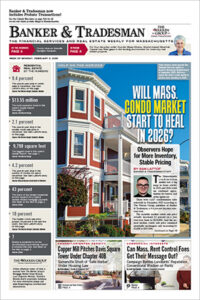
A harsh flu season, bad weather and potential signs of slowing price increases are helping shape the market that precedes the traditional spring selling season. iStock illustration
With an uptick in inventory in January and an uptick in home sales in February, the 2025 housing market has had a positive start but there is more than meets the eye in this winter’s sales market.
According to data from The Warren Group, the publisher of Banker & Tradesman, there were 4,765 single-family home sales in the first two months of 2025, a 7 percent increase from 2024. The median single-family home sale price increased 5.5 percent on the same basis to $580,000.
“We did see a surge of listings in January, which we were all taking as very positive news, given the inventory shortage that we have seen over the past few years,” said Massachusetts Association of Realtors 2025 President Sarah Gustafson. “However, when the February numbers came down, we were down in February, and anecdotally, across the state a lot of times in the winter months, especially with these numbers, it can have a lot to do with weather.”
While there was growth year-over-year in sales, numbers of listings actually flattened or fell in many American metro areas, according to Zillow.
In Greater Boston, the listings portal reported there was a 13.7 percent reduction in new listings year-over-year last month, with November’s and December also clocking in year-over-year drops.
The Worcester and Springfield metros also reported similar trends: a 24.07 percent fall in new listings in Worcester County last month, year-on-year, and a 16.29 drop in Hampden County, according to Zillow data. Both metros reported flat or declining numbers of new listings in January, December and November on a year-over-year basis.
Signs of Market Stabilizing?
Gerry Bourgeois, senior advisor to the CEO and chief operating officer at Lamacchia Realty, said that so far this year, the major forces shaping the 2025 market are playing out similarly to its 2024 counterpart.
“There’s still buyer demand out there but there’s affordability issues, especially in Massachusetts prices keep on heading up, and I think there’s a lot of people are still sitting tight,” he said. “It’s got to make sense for people to transact nowadays.”
While median sale prices have increased year-over-year each month, they’re are dropping on a month-to-month basis, Gustafson said.
“We did see the sales price decrease four months in a row and that’s very interesting, because that’s showing a beginning of a stabilization,” she said. “By decrease, we’re talking very small percentages on that, depending upon where you are in the state, but for years we saw it increasing, sometimes double digits, depending upon the market.”
Gustafson added that the prospect of a market settling down makes it even more imperative for agents and those selling homes to accurately price homes. John Veneziano, broker owner of RE/MAX Andrew Realty Services in Medford also noted that in a Massachusetts market that is seeing home listings turn into pending sales faster and faster. If an offer takes a couple of weeks to get accepted this is likely an indicator that a home isn’t being valued correctly.
“So, if I put your house on the market, I don’t have an offer accepted, let’s say it takes 14 days to get an offer accepted, on the 18th day, I’m calling you saying you’re overpriced,” he said. “You’ve been rejected by the entire market.”

Sam Minton
Harsh Weather, Harsh Flu Season
While data can be useful, there can be more to the market than just numbers.
“The weather does play a role, in January and February in Massachusetts,” said Bourgeois. “Also, it’s darker, afternoons are darker. People are less likely to go out looking at homes, when it’s dark, so that means a lot more that happen on the weekends. Now that it gets light later, people are more likely to be looking to get homes after work, because they can still see them.”
This winter, on top of the harsh weather, sellers and buyers had to wade through a harsh flu season.
According to the Centers for Disease Control, the cumulative flu hospitalization rate for the week ending on March 1 was the highest observed since the 2010-2011 season. And the CDC’s latest report says seasonal flu activity still remains elevated nationally, and could remain that way for a few more weeks.
While there can be factors that affect buyers’ desire to purchase or even simply attend an open house, life events can drive them to move despite poor weather or a lack of sunlight
“Some people have time,” Veneziano said of buyers. “If you’re a buyer and you have a lease that doesn’t expire for seven months, you are not really buying – you’re shopping. There’s three reasons why a buyer will pull the trigger. They’re motivated, they have the money, but the biggest thing is urgency. So, when does that lease expire? In three months, four months? Their wife’s pregnant, how soon is the baby coming? So, there’s always an urgency factor.”




